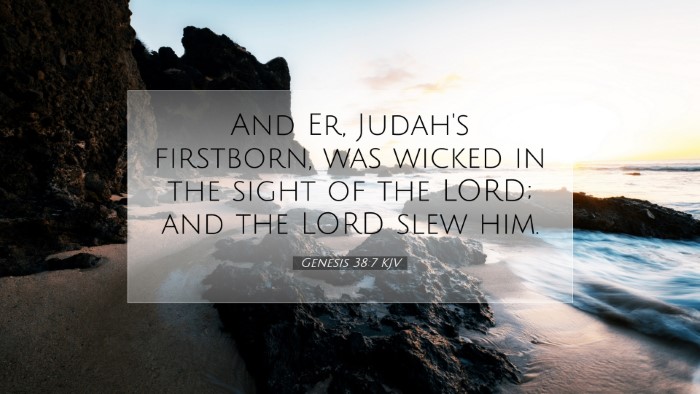Commentary on Genesis 38:7
Genesis 38:7 states: “But Er, Judah’s firstborn, was wicked in the sight of the LORD; and the LORD slew him.” This verse captures a pivotal moment in the narrative of Judah's family and sets a theological and moral tone that reverberates throughout Scripture. Here, we shall delve into various commentaries to extract profound insights pertinent to pastors, students, theologians, and scholars.
Context and Narrative Significance
The context of Genesis 38 is essential to grasp the implications of Er's wickedness. This chapter provides a juxtaposition to Joseph’s story, which is unfolding concurrently in Egypt. Judah, a key character, faces moral and ethical dilemmas that reflect the broader theme of sin and its consequences.
Matthew Henry's Insights
Matthew Henry emphasizes that Er's wickedness was not ambiguous; it was "wicked in the sight of the LORD." His actions warranted divine judgment, showcasing God's intolerance for sin. Henry elucidates the importance of fear and reverence for God in family leadership, citing that Judah should have instilled in his sons a fear of God.
- The Nature of Er's Wickedness: While the precise nature of Er's sin is not detailed, Henry reminds us that the nature of sin includes disobedience and idolatry. This serves as a warning to maintain faithfulness to God.
- Divine Judgment: Henry speaks to the severity of God's judgment, suggesting that it serves as a reminder of His sovereignty and moral order.
Albert Barnes' Perspective
Albert Barnes adds depth by noting the cultural implications of Er’s sin. He asserts that Er’s behavior was reflective of the pervasive immorality of surrounding societies, drawing a parallel to current cultural challenges. Barnes remarks on how the history of Judah’s family parallels humanity's struggle against sin.
- Social Commentary: Barnes posits that the societal context illustrates a call to holiness. Families are challenged to remain grounded in biblical principles amidst cultural decline.
- The Role of Divine Retribution: He highlights that God's judgment is not arbitrary; rather, it serves a purpose in the context of divine justice and the moral order established by God.
Adam Clarke's Analysis
Adam Clarke offers a scholarly examination of the text, particularly focusing on the Hebrew language and cultural understandings. Clarke suggests Er's wicked deeds could encompass an array of transgressions but left unqualified to draw attention to the seriousness of his character.
- Theological Implications: Clarke asserts that God’s judgment upon Er signifies that divine displeasure can lead to death and destruction. This serves to underscore the need for righteousness.
- God’s Sovereignty: He stresses that God’s decisions to intervene in human affairs must be viewed as integral to His sovereign will, illuminating the nature of God's involvement in human morality.
Theological Reflection
The events surrounding Genesis 38:7 raise profound theological implications regarding human sinfulness, divine justice, and the consequences of moral failure. The swift judgment faced by Er reinforces the idea that God is actively engaged in the world, seeking to uphold holiness.
Lessons for Today
- The Nature of Sin: The narrative reminds us that sin is serious and has consequences, not only for the sinner but also for the community and family.
- Family Responsibility: Parents are called to model godly living and instill a reverence for God in their children.
- Divine Accountability: Everyone, regardless of their station, stands accountable before God, which underlines the impartiality of divine justice.
Conclusion
Genesis 38:7 serves as a stark reminder of the holiness and righteousness of God. The insights drawn from public domain commentaries provide pastors, students, theologians, and Bible scholars with rich perspectives, encouraging deeper exploration into the seriousness of sin and the importance of striving towards a life that honors God. As we reflect on Er's fate, we are invited to consider our own lives in light of God’s expectations and the somber truth that moral failure can have dire consequences.


